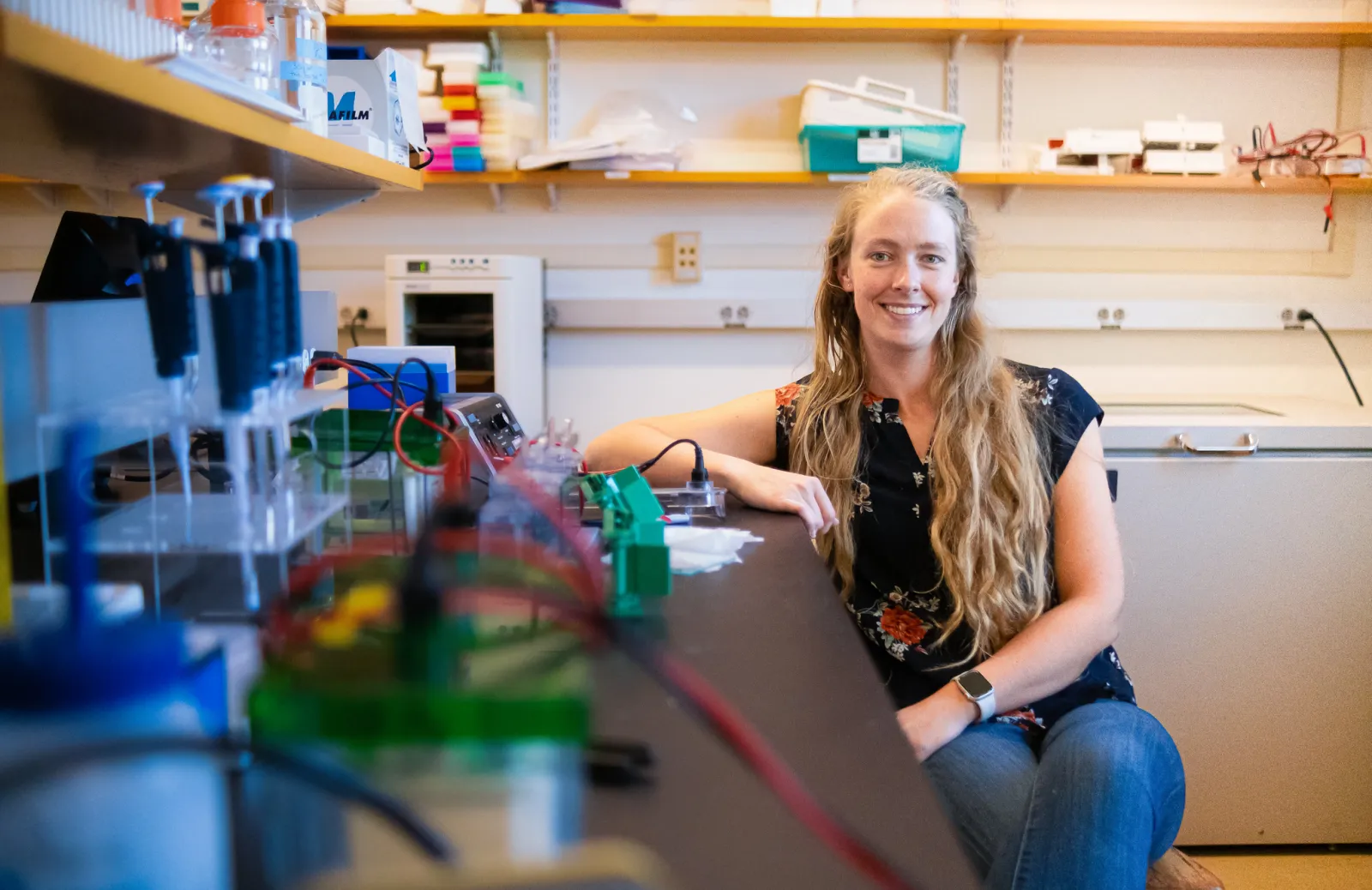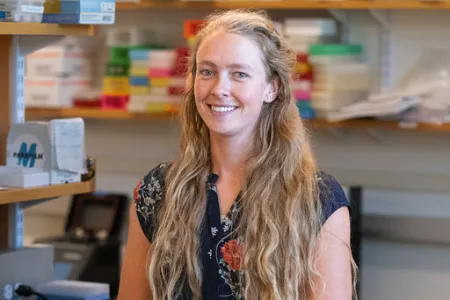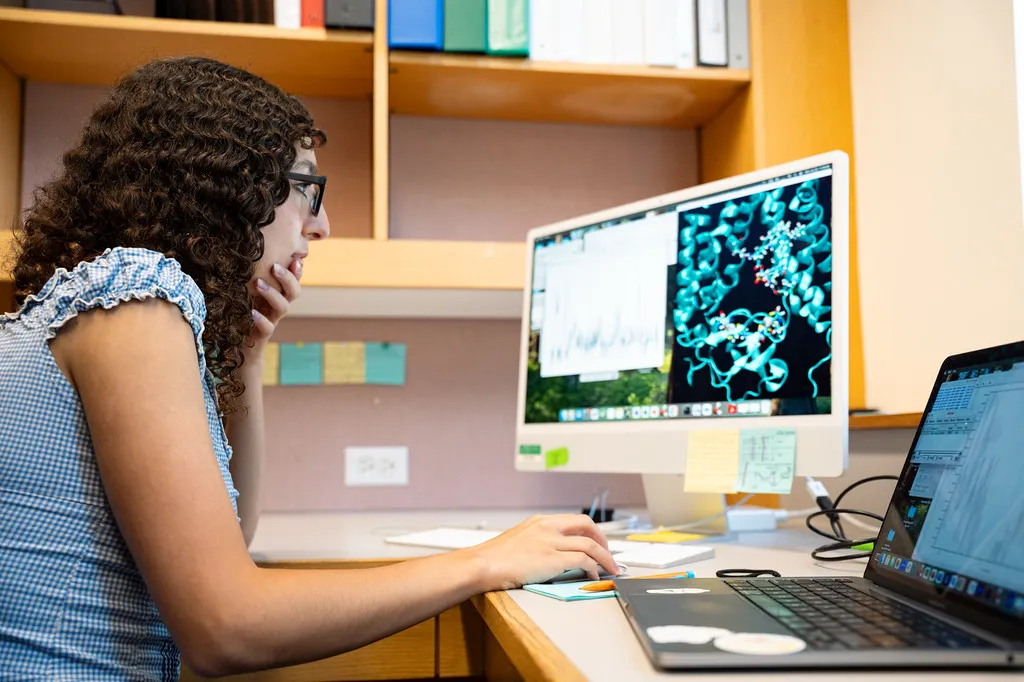Prof. Ashlee Plummer-Medeiros Receives NSF Grant for Cell Membrane Research

The National Science Foundation (NSF) has awarded a three-year grant to Assistant Professor of Chemistry Ashlee Plummer-Medeiros to research the structure and function of bacterial cell membranes as the cells grow. This $369,000 grant runs through July 2028 and will help train undergraduate students in research planning, methods, and analysis of results.
Bacterial membranes keep cells intact, essentially keeping what is inside the cells inside, while allowing some substances to enter the bacteria through selective permeability. The specific research of the Plummer-Medeiros lab focuses on how proteins in the membrane interact with lipids. This knowledge is central to understanding what makes the membranes permeable or impermeable to external molecules such as antibiotics. Rather than using actual bacteria, the laboratory makes vesicles, little packets surrounded by synthetic membranes, the composition of which can be altered to test the effects of membrane proteins on the formation and movement of membrane phospholipids.
The research involves work in two directions. One is biochemical “wet lab” work on actual vesicles to see how they interact with each other, and a second direction involves computational biochemistry. The latter uses computer simulations of proteins embedded in the membranes to see how they interact with the lipids as well as with other proteins. The two approaches are complementary, with the work using synthetic vesicles leading to new computational modeling, and the computational side generating hypotheses that can be tested using modified proteins in vesicle membranes.
The grant is part of the NSF Research in Undergraduate Institutions program. Plummer-Medeiros welcomes participation by students interested in the wet lab work of testing protein functions in synthetic vesicles as well as by students who want to work on the computational aspects of the research.
“I have students working in my lab who are interested in biology, biochemistry, mathematics, and data analysis," Plummer-Medeiros says. "These students work together with complementary approaches and backgrounds to better understand how our proteins work. This diversity in insight offers novel ideas and directions for our work."
Each student proposes a project with Plummer-Medeiros’ guidance and mentoring, and then they take the lead on it, typically working in her lab in their sophomore through senior years. At the end, many write a senior thesis summarizing the work.
“My multi-faceted approach to student training balances the development of technical skills, analytical and problem-solving skills, scientific communication skills, and teamwork skills,” says Plummer-Medeiros. “This holistic approach to mentoring helps students become independent critical thinkers who will excel in their future STEM careers.”
Plummer-Medeiros has one graduate student, Sonja Neve-Hoversten, and six undergraduates — Virginia Durcan, Suli Kamholtz-Roberts, Jenna Mackenroth, and Gabi Przybylska from the Class of 2026, and Charlee Hutt and Madeline Le from the Class of 2027 — working in her lab.
In addition to helping students build scientific knowledge and research skills, Plummer-Medeiros fosters a culture of mentorship — both through her own teaching and by pairing advanced students with those just starting out.
In 2023, Plummer-Medeiros began partnering with the Franklin Institute’s STEM Scholars program for Philadelphia high school students. Bryn Mawr students who work in the lab over the summer run a two-day workshop on scientific literacy and the scientific method for the high schoolers.
“I think it is really helping them develop their communication skills for a general audience and also participate in our community in a way that we don't always get to do when we're in the lab doing our experiments,” she says.
By sharing their own enthusiasm for STEM, the Bryn Mawr students also help the STEM Scholars better see themselves pursuing a career in science.
“They're going to be fantastic educators and teachers,” she says of her students. “I think giving them opportunities like working with the STEM Scholars at the Franklin Institute is really important."

Ashlee Plummer-Medeiros
Assistant Professor of Chemistry Ashlee Plummer-Medeiros teaches in the Chemistry Department as well as in Biochemistry and Molecular Biology. She joined Bryn Mawr College in 2022, and her area of focus is biological chemistry.
